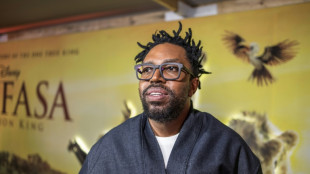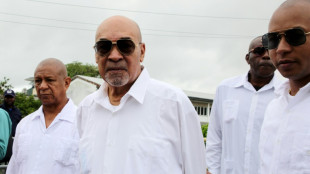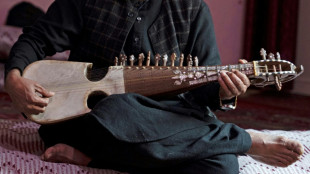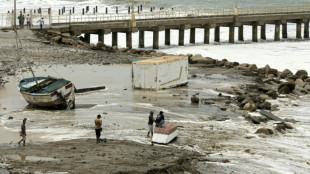
-
 Sudan government rejects UN-backed famine declaration
Sudan government rejects UN-backed famine declaration
-
Past champions USA and Germany win at United Cup

-
 Both 'Mufasa' and 'Sonic' claim N.America box office supremacy
Both 'Mufasa' and 'Sonic' claim N.America box office supremacy
-
Juve game interrupted after fans abuse Vlahovic

-
 No enjoyment, 'just relief' for Guardiola as Man City stop rot at Leicester
No enjoyment, 'just relief' for Guardiola as Man City stop rot at Leicester
-
Man City find winning formula as Forest go second in Premier League

-
 Glitzy Calabar Carnival wraps up tough year in Nigeria
Glitzy Calabar Carnival wraps up tough year in Nigeria
-
Man City stop the rot with victory at Leicester

-
 Suriname ex-dictator died of liver failure, autopsy shows
Suriname ex-dictator died of liver failure, autopsy shows
-
Shahidi 179 not out as draw looms for Afghanistan in Zimbabwe Test

-
 Some Americans in Panama reject Trump's canal threat
Some Americans in Panama reject Trump's canal threat
-
Ljutic powers to Semmering slalom to end Croatian drought

-
 Taliban leader bans windows overlooking women's areas
Taliban leader bans windows overlooking women's areas
-
Mikheil Kavelashvili, ex-Man City striker and Georgia's disputed far-right president

-
 Azerbaijan says Russia shot at plane before crash, demands it admit
Azerbaijan says Russia shot at plane before crash, demands it admit
-
Salome Zurabishvili: outgoing Georgian leader defying the government

-
 Moeller wins super-G to record maiden World Cup victory
Moeller wins super-G to record maiden World Cup victory
-
At least 177 dead in South Korea's worst plane crash

-
 Rabada unlikely batting star as South Africa edge Pakistan in thriller
Rabada unlikely batting star as South Africa edge Pakistan in thriller
-
Chad votes in triple elections after three years of army rule

-
 Jailed PKK leader says 'ready' to support Turkey peace drive
Jailed PKK leader says 'ready' to support Turkey peace drive
-
Three die in clandestine Channel crossing attempt

-
 Georgia's new president sworn in amid political showdown
Georgia's new president sworn in amid political showdown
-
Celestial V70 wins overall honours in Sydney to Hobart yacht race

-
 Zverev helps champions Germany knock Brazil out of United Cup
Zverev helps champions Germany knock Brazil out of United Cup
-
All but two feared dead after South Korea plane crashes with 181 aboard

-
 Croatia elects president as incumbent looks favourite
Croatia elects president as incumbent looks favourite
-
Ruud wins but Norway crash to Czech Republic at United Cup

-
 Olympic table tennis champ says never 'officially informed' about fines
Olympic table tennis champ says never 'officially informed' about fines
-
Djokovic plans to keep playing for 'years to come'

-
 North Korea calls for 'toughest' US strategy at party meeting
North Korea calls for 'toughest' US strategy at party meeting
-
Djokovic calls for doping transparency after Sinner, Swiatek cases

-
 Bumrah rips out Australia middle order as India fight back in 4th Test
Bumrah rips out Australia middle order as India fight back in 4th Test
-
Brunson's 55 points propel Knicks to overtime win over Wizards

-
 Drama, dreams: Japan's wildly popular school football breeds future stars
Drama, dreams: Japan's wildly popular school football breeds future stars
-
Georgia set to inaugurate disputed president amid political crisis

-
 Japan's Wajima craftmakers see hope in disaster-hit region
Japan's Wajima craftmakers see hope in disaster-hit region
-
Five events to look out for in 2025

-
 Five sports stars to watch in 2025
Five sports stars to watch in 2025
-
Plane with 181 on board crashes in South Korea, killing 29

-
 UNESCO-listed musical instrument stifled in Afghanistan
UNESCO-listed musical instrument stifled in Afghanistan
-
Excited Osaka says 'deep love' of tennis keeps her going

-
 Baseball superstar Ohtani expecting first baby
Baseball superstar Ohtani expecting first baby
-
For German 'sick leave detective', business is booming

-
 Konstas, Khawaja fall as Australia extend lead to 158 over India
Konstas, Khawaja fall as Australia extend lead to 158 over India
-
Impressive Herbert leads Chargers into playoffs, Broncos denied

-
 One dead in Ecuador, Peru ports closed amid massive waves
One dead in Ecuador, Peru ports closed amid massive waves
-
NBA hand out suspensions after fracas in Phoenix

-
 Atalanta snatch late draw at Lazio to hold Serie A lead
Atalanta snatch late draw at Lazio to hold Serie A lead
-
Trump sides with Musk in right-wing row over worker visas

| SCS | 0.58% | 11.97 | $ | |
| NGG | 0.66% | 59.31 | $ | |
| RELX | -0.61% | 45.58 | $ | |
| BCC | -1.91% | 120.63 | $ | |
| CMSD | -0.67% | 23.32 | $ | |
| RBGPF | 100% | 59.84 | $ | |
| CMSC | -0.85% | 23.46 | $ | |
| RIO | -0.41% | 59.01 | $ | |
| BCE | -0.93% | 22.66 | $ | |
| RYCEF | 0.14% | 7.27 | $ | |
| GSK | -0.12% | 34.08 | $ | |
| BTI | -0.33% | 36.31 | $ | |
| VOD | 0.12% | 8.43 | $ | |
| AZN | -0.39% | 66.26 | $ | |
| JRI | -0.41% | 12.15 | $ | |
| BP | 0.38% | 28.96 | $ |

Lebanon army deploys under Israel-Hezbollah ceasefire
Lebanon's military deployed troops and tanks across the country's south on Thursday as a ceasefire in the Israel-Hezbollah war largely held for a second day.
The truce ended a war that began a day after Hamas's unprecedented October 7, 2023 attack on Israel, killing thousands in Lebanon and sparking mass displacements in both Lebanon and Israel.
Israel shifted its focus from Gaza to Lebanon in September to secure its northern border from Hezbollah attacks, dealing the Iran-backed Shiite Muslim movement a series of staggering blows.
Under the terms of the ceasefire, the Lebanese army and UN peacekeepers were to become the only armed presence in south Lebanon, where Hezbollah has long held sway.
A Lebanese army source said its forces were "conducting patrols and setting up checkpoints" south of the Litani River without advancing into areas where Israeli forces were still present.
In the border village of Qlaaya, residents threw rice and flowers to celebrate the arrival of Lebanese soldiers.
"We only want the Lebanese army," chanted the residents of the Christian-majority village, as they clapped and cheered for the troops and waved the Lebanese red, white and green flag.
Since the ceasefire took effect on Wednesday, tens of thousands of Lebanese who fled their homes have headed back to their towns and villages, only to find scenes of devastation.
"Despite all the destruction and the sorrow, we are happy to be back," said Umm Mohammed Bzeih, a widow who fled with her four children from the southern village of Zibqin two months ago.
"I feel as if our souls have returned," she said, visibly exhausted as she swept up the shattered glass and pieces of stones that carpeted the floor.
- Crisis -
While there was joy around Lebanon that the war has ended, it will take the country a long time to recover.
Even prior to the conflict, it had been wracked for years by political and economic crisis, with World Bank data from earlier this year indicating poverty had tripled in a decade.
On Thursday, there was a glimmer of hope as the official National News Agency reported parliament would meet to elect a president on January 9, following a two-year vacuum.
Lebanon is deeply divided along political and sectarian lines, with Hezbollah long dominating the Shiite Muslim majority.
Hezbollah, the only armed group that refused to surrender its weapons following the 1975-90 civil war, built its popularity by providing health and education services.
It has maintained a formidable arsenal, supplied chiefly by Iran, which is widely regarded as more powerful than that of the Lebanese army.
While it did not take part in any direct talks for the ceasefire, which was brokered by the United States and France, it was represented by ally parliament speaker Nabih Berri.
Hezbollah proclaimed on Wednesday that it had achieved "victory" in the war against Israel, after the truce took effect.
"Victory from God almighty was the ally of the righteous cause," it said, adding its fighters would "remain in total readiness to deal with the Israeli enemy's ambitions and its attacks".
But the war saw Israel deal Hezbollah a string of unprecedented blows, key among them the killing in September of its longtime leader Hassan Nasrallah.
Other losses suffered by the group include the death of a string of other top commanders, as well as the killing of the man touted to succeed Nasrallah, Hashem Safieddine.
Hezbollah lawmaker Hassan Fadlallah told AFP his group was cooperating on the army's deployment in the south.
There is "full cooperation" with the Lebanese state in strengthening the army's deployment, he said, adding the group had "no visible weapons or bases" but "nobody can make residents leave their villages".
- Phased withdrawal -
In northern Israel, which has come under steady attack from Hezbollah for more than a year, there was hope tinged with scepticism over whether a truce can last.
Nissim Ravivo, a 70-year-old in the coastal city of Nahariya, just 10 kilometres (six miles) from the border with Lebanon, voiced disappointment.
"It's a shame, we should have continued for at least another two months and finished the job," he said. "We still don't feel safe and we are not happy about it."
On the Israeli side, the hostilities with Hezbollah have killed at least 82 soldiers and 47 civilians, authorities there say.
Under the ceasefire deal, Israeli forces will hold their positions but "a 60-day period will commence in which the Lebanese military and security forces will begin their deployment towards the south", a US official told reporters on condition of anonymity.
Then Israel will begin a phased withdrawal without a vacuum forming that Hezbollah or others could rush into, the official said.
The Israeli and Lebanese militaries have both called on residents of frontline villages to avoid returning home immediately.
"We control positions in the south of Lebanon, our planes continue to fly in Lebanese airspace," Israeli army spokesman Daniel Hagari said.
"We control positions in the south of Lebanon, our planes continue to fly in Lebanese airspace."
A.S.Diogo--PC
